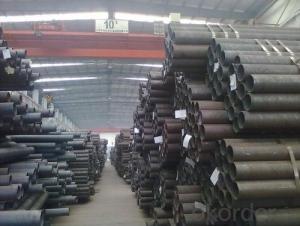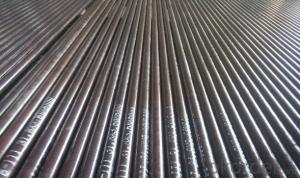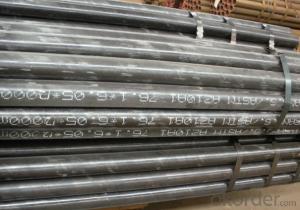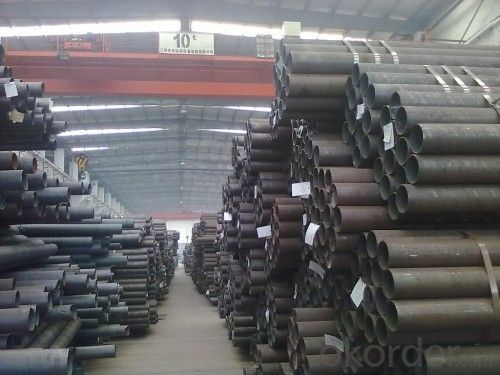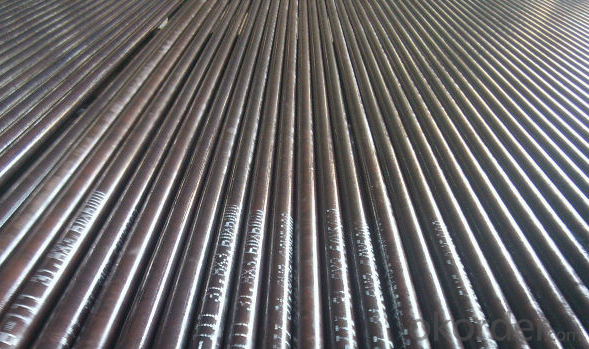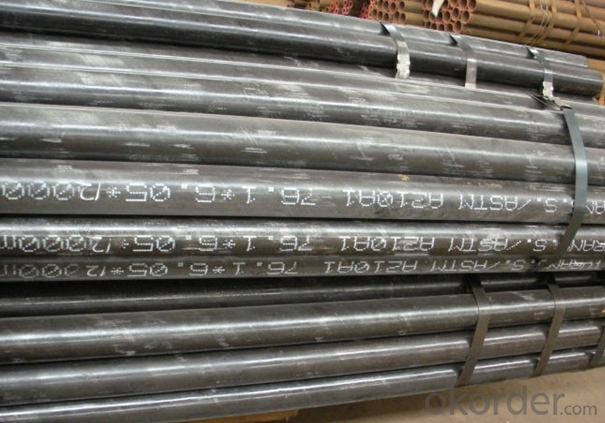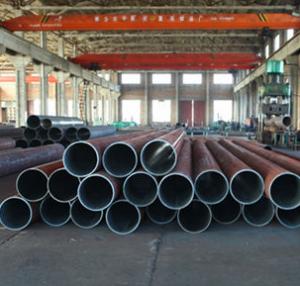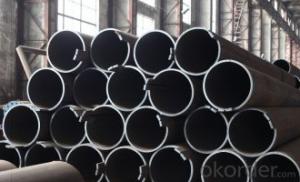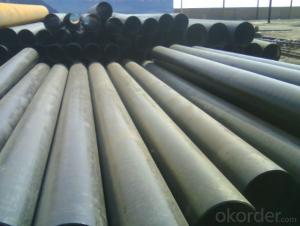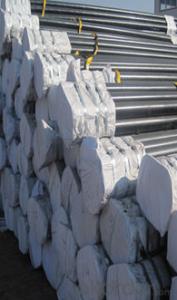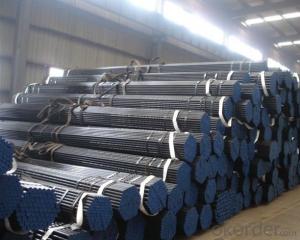Carbon Steel Seamless Pipe For Boiler A53-A369 CNBM
- Loading Port:
- Qingdao
- Payment Terms:
- TT OR LC
- Min Order Qty:
- 10 pc
- Supply Capability:
- 30 pc/month
OKorder Service Pledge
OKorder Financial Service
You Might Also Like
Quick Details
| Thickness: | 1.2 - 20 mm | Section Shape: | Round | Outer Diameter: | 12.7 - 168 mm |
| Place of Origin: | Jiangsu China (Mainland) | Secondary Or Not: | Non-secondary | Application: | Boiler Pipe |
| Technique: | Cold Drawn | Certification: | PED | Surface Treatment: | oil coating |
| Special Pipe: | Thick Wall Pipe | Alloy Or Not: | Is Alloy | ASTM A213: | T2,T5,T9,T11,T12,T22,T23,T91,T91 |
| ASTM A335: | P1,P2,P5,P9,P11,P12,P22,P23,P91,P92 | DIN17175: | 15Mo3,10CrMo910,12CrMo195,13CrMo44 | Grade: | 12Cr1MoV,Cr5Mo,Cr9Mo,12Cr1MoVG,Cr5MoG,A335 P11,A335 P5,A335 P9,A335 P1,A213,A192,A210,A335 P12,A335 P23,St35.8,Cr-Mo alloy,A53-A369,ST35-ST52 |
| Standard: | BS 3059-2,DIN EN 10216-1-2004,DIN 17175,ASTM A213-2001,ANSI A210-1996,ASTM A179-1990,BS,DIN,ASTM |
Packaging & Delivery
| Packaging Detail: | Seaworthy export packing |
| Delivery Detail: | 45 Days |
Specifications
Standard: ASTM A179,ASTM A192,ASTM A210,DIN17175,EN10216-1
Material:P235GH,ST35.8,ST45.8
Manufacture method:cold drawn
Product Description
Commodity: Carbon steel seamless pipe for boiler
Standard&material: ASTM A179,ASTM A192,ASTM A210 Gr.A1,Gr.C,DIN17175 ST35.8,ST45.8,EN10216-1 P235GH,P265GH,etc.
Size range: 12mm*1.2mm - 168mm*20mm
Manufacture method: cold rolled, cold drawn
Delivery condition: Normalized, Normalized and Tempered.
Mill test certificate as per EN10204 3.1B is available.
Third party inspection is acceptable.
Tubes will be ECT+UT.
- Q: Can steel pipes be used for underground irrigation systems?
- Yes, steel pipes can be used for underground irrigation systems. Steel pipes are durable, corrosion-resistant, and can withstand high pressure, making them suitable for underground applications. However, it is important to ensure proper coating and protection against corrosion to maintain their longevity in underground environments.
- Q: Does the seamless steel pipe need rust removal?
- The main use of steel wire brush and other tools to polish the surface of the steel, you can remove loose or tilted skin, rust, welding slag and so on. Manual tool derusting can reach Sa2 level, power tools derusting can reach Sa3 level, if the surface of the steel attached to the solid oxide sheet, tool rust removal effect is not ideal, can not reach the corrosion protection requirements of the anchor depth.
- Q: Can steel pipes be used for cooling systems?
- Yes, steel pipes can be used for cooling systems. Steel pipes are commonly used in various industrial cooling applications due to their durability, high strength, resistance to corrosion, and ability to withstand high pressure and temperature conditions.
- Q: How are steel pipes used in the construction of gas distribution networks?
- Steel pipes are commonly used in the construction of gas distribution networks due to their strength, durability, and ability to withstand high pressure. These pipes are used to transport natural gas from the source to homes, businesses, and industries safely and efficiently. They are often buried underground and connected through a network of pipes, allowing for the distribution of gas to various locations. The corrosion-resistant nature of steel ensures the longevity of the pipes, making them a reliable choice for gas distribution infrastructure.
- Q: What is the maximum length of steel pipes available?
- The maximum length of steel pipes available can vary depending on the specific manufacturer and supplier. However, in general, steel pipes can be found in lengths ranging from 18 feet to 40 feet or even longer.
- Q: What are the different types of steel pipe coatings for underground applications?
- There are several types of steel pipe coatings used for underground applications, including fusion bonded epoxy (FBE) coating, three-layer polyethylene (3LPE) coating, three-layer polypropylene (3LPP) coating, and coal tar enamel (CTE) coating. Each of these coatings provides different levels of protection against corrosion and abrasion, ensuring the longevity and durability of the steel pipes in underground environments.
- Q: What is the role of steel pipes in the renewable energy sector?
- Steel pipes play a crucial role in the renewable energy sector as they are commonly used for transporting various fluids, including water, steam, and gases, in renewable energy systems. They are extensively utilized in the construction of wind turbines, solar power plants, and geothermal installations. Steel pipes are employed for the transportation of water in hydroelectric power plants and for the transmission of heat in concentrated solar power systems. Additionally, they are instrumental in the distribution and storage of fuels such as hydrogen and biogas, which are vital components of renewable energy technologies. Overall, steel pipes provide a reliable and durable means of transporting resources and energy within the renewable energy sector.
- Q: What are the different types of steel pipe supports?
- There are several types of steel pipe supports, including pipe hangers, pipe clamps, pipe saddles, pipe brackets, and pipe supports with rollers.
- Q: What are the environmental impacts of steel pipe production and disposal?
- Significant environmental impacts are associated with the production and disposal of steel pipes. First and foremost, the production of steel pipes necessitates the extraction of raw materials such as iron ore, coal, and limestone. This extraction process leads to the destruction of habitats, deforestation, and soil erosion. Furthermore, mining and processing these materials require a substantial amount of energy, often derived from fossil fuels, which contributes to the emission of greenhouse gases and air pollution. The manufacturing process itself encompasses various stages, such as melting, casting, rolling, and coating, all of which demand considerable energy inputs and emit substantial quantities of carbon dioxide and other greenhouse gases. Additionally, the production of steel pipes involves the utilization of chemicals and additives that can pose harm to the environment if not properly managed. Moreover, if steel pipes are not recycled or appropriately dealt with during disposal, they can end up in landfills, thus contributing to waste accumulation and occupying valuable space. Steel is typically non-biodegradable and can take hundreds of years to decompose. When steel pipes are dumped in landfills, they can release toxic substances and heavy metals, which can contaminate soil and groundwater. Nevertheless, it is important to acknowledge that steel pipes are highly recyclable, and recycling them significantly mitigates the environmental impact. Recycling steel pipes aids in the conservation of natural resources, reduces energy consumption, and lowers greenhouse gas emissions. Additionally, using recycled steel in the production of new pipes requires less energy and results in fewer emissions compared to using virgin materials. To minimize the environmental impacts of steel pipe production and disposal, it is crucial to advocate sustainable practices throughout the entire lifecycle of the product. This entails reducing energy consumption, utilizing renewable energy sources, implementing proper waste management strategies, and encouraging the recycling and reuse of steel pipes.
- Q: What is the difference between steel pipes and polyethylene pipes?
- Steel pipes are made of a strong and durable material, steel, which makes them suitable for high-pressure and high-temperature applications. They are also resistant to corrosion, making them ideal for transporting liquids and gases. On the other hand, polyethylene pipes are made of a flexible plastic material, which makes them easier to install and handle. They are lightweight, resistant to chemicals, and have a low risk of corrosion. However, they may not be suitable for very high-pressure or high-temperature applications.
Send your message to us
Carbon Steel Seamless Pipe For Boiler A53-A369 CNBM
- Loading Port:
- Qingdao
- Payment Terms:
- TT OR LC
- Min Order Qty:
- 10 pc
- Supply Capability:
- 30 pc/month
OKorder Service Pledge
OKorder Financial Service
Similar products
Hot products
Hot Searches
Related keywords
